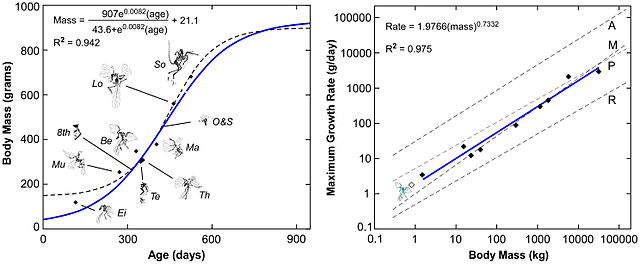 |
This is a file from the Wikimedia Commons. Information from its description page there is shown below.
Commons is a freely licensed media file repository. You can help.
|
Summary
| DescriptionArchaeopteryx growth curve.jpg |
Figure 9. Growth depictions for Archaeopteryx.
(Left) The size and estimated age for all ten specimens are depicted. The growth curves are based upon age and size estimates (diamonds) for the eight specimens where femoral length is known. The dashed line represents the best fit for the unconstrained statistical analysis with hatchling and adult size undefined. The solid line represents the best fit when hatchling and adult size are constrained. (Right) The maximal growth rates from these analyses (1.87–2.2 g/day; hollow diamond) fit expectations (1.83–1.87 g/day; ) for same-sized non-avialan dinosaurs (solid line) – animals that grew like slow growing endotherms, here compared to marsupials (M). The Archaeopteryx estimates are three times lower than typical rates for extant precocial land birds (5.7 g/day; P], 15 times lower than altricial land birds (28.6 g/day; A), and four times higher than typical rates for extant reptiles (0.46 g/day; R) . Specimens designations: Ei = Eichstäat, Mu = Munich, 8th = 8th Exemplar, Te = Teyler, Th = Thermopolis, Be = Berlin, Ma = Maxberg, O&S = Exemplar der Familien Ottmann & Steil, Lo = London, So = Solnhofen.
doi:10.1371/journal.pone.0007390.g009
|
| Date |
2009 |
| Source |
http://www.plosone.org/article/info%3Adoi%2F10.1371%2Fjournal.pone.0007390;jsessionid=77529EC4AC50113350A4E28D82B9DC1E |
| Author |
Erickson GM, Rauhut OWM, Zhou Z, Turner AH, Inouye BD, et al. |
Licensing

 |
This file is licensed under the Creative Commons Attribution 2.5 Generic license. |
|
|
|
- You are free:
- to share – to copy, distribute and transmit the work
- to remix – to adapt the work
- Under the following conditions:
- attribution – You must attribute the work in the manner specified by the author or licensor (but not in any way that suggests that they endorse you or your use of the work).
http://creativecommons.org/licenses/by/2.5 CC-BY-2.5 Creative Commons Attribution 2.5 truetrue
|
File usage
The following pages on Schools Wikipedia link to this image (list may be incomplete):
This file contains additional information, probably added from the digital camera or scanner used to create or digitize it. If the file has been modified from its original state, some details may not fully reflect the modified file.
SOS Childrens Villages chose the best bits of Wikipedia to help you learn. SOS Childrens Villages believes that a decent childhood is essential to a happy, healthy. Our community work brings families new opportunities through education, healthcare and all manner of support. Have you thought about sponsoring a child?


